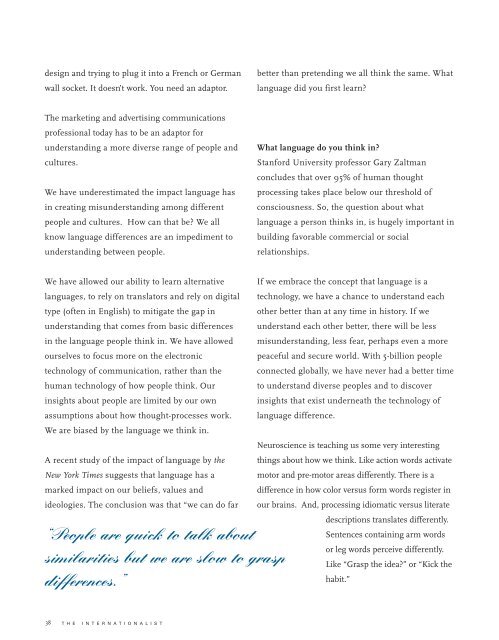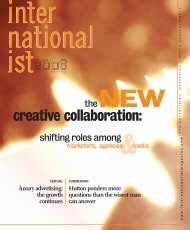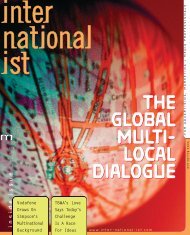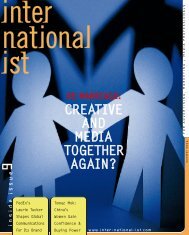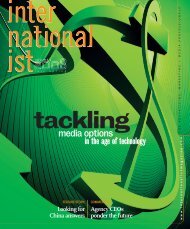2011 Issue 55 - Internationalist
2011 Issue 55 - Internationalist
2011 Issue 55 - Internationalist
You also want an ePaper? Increase the reach of your titles
YUMPU automatically turns print PDFs into web optimized ePapers that Google loves.
internationalist<br />
design and trying to plug it into a French or German<br />
the<br />
wall socket. It doesn’t work. You need an adaptor.<br />
better than pretending we all think the same. What<br />
language did you first learn?<br />
The marketing and advertising communications<br />
professional today has to be an adaptor for<br />
understanding a more diverse range of people and<br />
cultures.<br />
We have underestimated the impact language has<br />
in creating misunderstanding among different<br />
people and cultures. How can that be? We all<br />
know language differences are an impediment to<br />
understanding between people.<br />
LOGO2 — news gothic<br />
What language do you think in?<br />
Stanford University professor Gary Zaltman<br />
concludes that over 95% of human thought<br />
processing takes place below our threshold of<br />
consciousness. So, the question about what<br />
language a person thinks in, is hugely important in<br />
building favorable commercial or social<br />
relationships.<br />
We have allowed our ability to learn alternative<br />
languages, to rely on translators and rely on digital<br />
type (often in English) to mitigate the gap in<br />
understanding that comes from basic differences<br />
in the language people think in. We have allowed<br />
ourselves to focus more on the electronic<br />
technology of communication, rather than the<br />
human technology of how people think. Our<br />
insights about people are limited by our own<br />
assumptions about how thought-processes work.<br />
We are biased by the language we think in.<br />
A recent study of the impact of language by the<br />
New York Times suggests that language has a<br />
marked impact on our beliefs, values and<br />
ideologies. The conclusion was that “we can do far<br />
“People are quick to talk about<br />
similarities but we are slow to grasp<br />
differences.”<br />
If we embrace the concept that language is a<br />
technology, we have a chance to understand each<br />
other better than at any time in history. If we<br />
understand each other better, there will be less<br />
misunderstanding, less fear, perhaps even a more<br />
peaceful and secure world. With 5-billion people<br />
connected globally, we have never had a better time<br />
to understand diverse peoples and to discover<br />
insights that exist underneath the technology of<br />
language difference.<br />
Neuroscience is teaching us some very interesting<br />
things about how we think. Like action words activate<br />
motor and pre-motor areas differently. There is a<br />
difference in how color versus form words register in<br />
our brains. And, processing idiomatic versus literate<br />
descriptions translates differently.<br />
Sentences containing arm words<br />
or leg words perceive differently.<br />
Like “Grasp the idea?” or “Kick the<br />
habit.”<br />
38<br />
T H E<br />
I N T E R N A T I O N A L I S T


